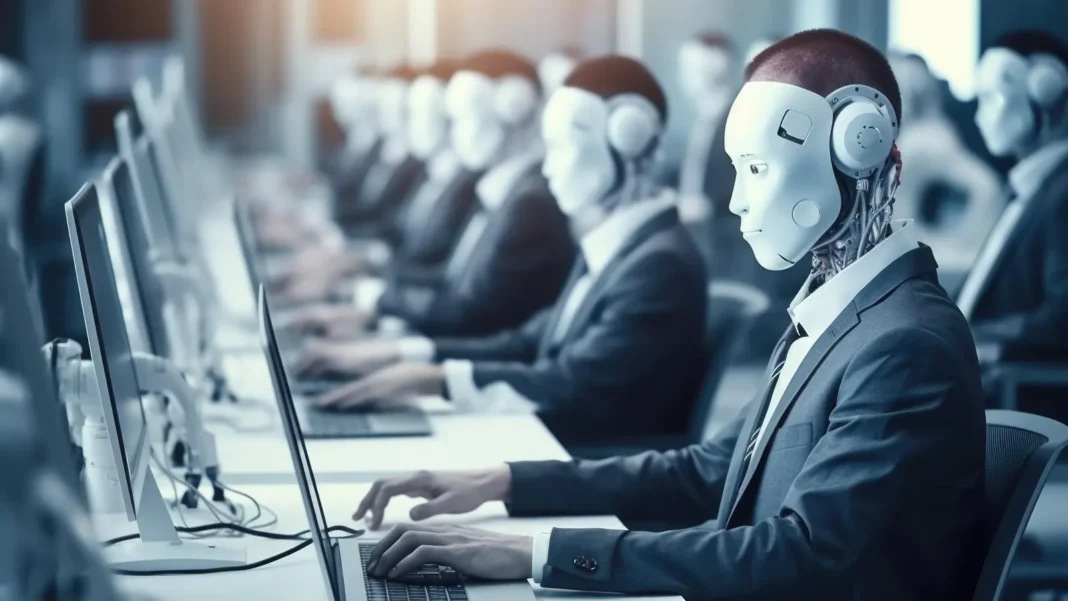Automation has always been a double-edged sword, offering both immense opportunities and deep-seated concerns about the future of work. Today, Artificial Intelligence (AI) is at the forefront of this transformation, revolutionizing industries worldwide. While AI is expected to enhance human labor by making processes more efficient, many wonder whether “job augmentation” could also mean job displacement. History tells us that technological advancements often lead to shifts in employment, changing the nature of work rather than eliminating it.
The prospect becomes even more alarming when microcomputer pioneer and businessman Bill Gates weighs in on AI’s potential to diminish human roles in critical fields like medicine and healthcare.
Speaking with Jimmy Fallon on NBC’s The Tonight Show, Bill Gates noted that, within the next decades, AI will dramatically reshape society, reducing human roles in critical fields. He further added that advancement in Artificial Intelligence(AI) means humans will soon be unnecessary “for most things.”
In Africa, Artificial Intelligence (AI) is poised to revolutionize various industries over the next decade. As automation advances, many professions across the continent may undergo significant changes, with AI-driven systems taking over repetitive tasks.
One key example is agriculture, where AI-powered machinery and robotics can streamline farming operations, reducing dependence on manual labor while boosting efficiency and productivity.
Shifting the focus beyond agriculture, below are many other job types that could be affected in various ways.
- Administrative
Generative AI tools can assist office administrators and assistants with various tasks, including drafting email correspondence, analyzing data trends, coordinating meeting schedules across different time zones, and performing summary and synthesis functions.
- Cashiers
Self-checkout systems and digital payment solutions are emerging, potentially reducing the demand for cashiers. For example, MTN MoMo enables users to make cashless payments through mobile money services, eliminating the need for physical cash transactions at retail stores.
- Doctors
Just as Bill Gates projected about the future of teachers, AI is transforming healthcare, but rather than fully replacing doctors, it is reshaping their roles by automating certain tasks and enhancing medical decision-making. It helps enhance diagnostics, personalized treatment, and surgical precision.
Machine learning models can analyze X-rays and medical scans with remarkable accuracy, helping doctors detect diseases early.
- Teachers
AI is rapidly transforming education, bringing both challenges and opportunities for teachers. One major concern is that advanced AI tools make it more difficult to detect plagiarism or student misconduct in assignments. However, rather than replacing educators, AI can serve as a valuable assistant, streamlining various tasks and enhancing efficiency in the classroom.
Looking at past technological shifts, AI in education may follow a similar trajectory to calculators, which were once controversial but are now standard tools in learning. Just as students gradually integrated calculators into their studies, AI-driven platforms like ChatGPT may eventually become accepted as learning aids, helping students process information, structure ideas, and explore complex topics under guidance.
- Human Resource
Artificial Intelligence’s growing influence in the workplace has sparked concerns about job security, creating unique challenges for human resources (HR) departments. As companies explore automation, HR professionals must navigate the balance between innovation and workforce stability.
According to Patrick Thibodeau, senior news writer at TechTarget, Generative AI is poised to reshape HR operations entirely. One key area of transformation is recruitment, where AI-powered tools can identify qualified candidates, analyze resumes, and streamline routine recruiter tasks.
- Data Entry Operators
AI algorithms are increasingly transforming data entry processes by automating repetitive tasks, reducing human effort and minimizing errors. These advanced systems can quickly extract, process, and categorize information from various sources, improving efficiency and accuracy
- Content writers
AI-generated content is reshaping the writing industry, especially in areas where originality and nuance are less emphasized. While automated text floods the internet, the demand for unique, human-created content is expected to rise.
Writers can use AI to enhance grammar, refine structure, and generate ideas, improving their workflow. However, creativity and deep expertise will remain essential in producing meaningful content.
- Tellers and Bank Clerks
AI-powered banking systems and digital transactions can reduce the need for human tellers and clerks.
AI-driven fraud detection and risk assessment tools can also enhance security, ensuring safer and more efficient financial transactions.
- Graphic Designers
Generative AI is transforming graphic design by automating tasks like logo creation, layout design, and image editing. Tools like Adobe Sensei and Canva’s AI features enable users to generate visuals with minimal effort.
While AI handles repetitive work, it lacks true creativity and emotional depth in branding and storytelling. Designers who embrace AI can focus on strategy, originality, and high-level conceptual work.
- Programmers/coders
AI-driven coding tools like ChatGPT can generate clean, well-structured code faster than many developers. This shift might worry those who rely on speed rather than quality, as automation can handle repetitive coding tasks efficiently.
However, skilled programmers who focus on problem-solving, innovation, and complex development will continue to be essential.
If humans fail to adapt swiftly to technological advancements, artificial intelligence may gradually replace their roles, potentially leading to widespread job displacement over time.




